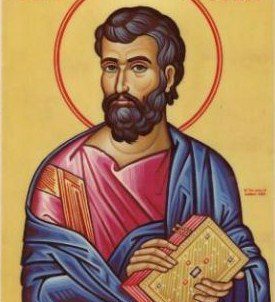
Saint Mark (martyred 68 AD)
Feast Day: April 25
In 41 AD, Herod Agrippa I, king of Judea had James, the son of Zebedee, killed. He also had Peter arrested, but Peter was miraculously saved by angels and escaped (Acts 12:1–19). Peter then went to Antioch, then through Asia Minor and arrived in Rome in the second year of Emperor Claudius. Along the way, Peter met Mark and took him as travel companion and interpreter. Mark wrote down the sermons of Peter and composed the Gospel.
Mark went to Cyprus with Barnabas after the Council of Jerusalem (Acts 15:39). In around 49 AD, Mark travelled to Alexandria and founded the Church of Alexandria, thus becoming the first bishop of Alexandria. The Coptic Churches trace their origins to Mark’s community. In 68 AD, Mark was martyred in Alexandria by pagans for turning the Alexandrians away from the worship of pagan gods; they tied a rope around his neck and dragged him through the streets until he died.
Acts of the Apostles (12:1-25)
About that time King Herod laid hands upon some members of the church to harm them. He had James, the brother of John, killed by the sword, and when he saw that this was pleasing to the Jews he proceeded to arrest Peter also. (It was the feast of Unleavened Bread.) He had him taken into custody and put in prison under the guard of four squads of four soldiers each. He intended to bring him before the people after Passover.
Peter thus was being kept in prison, but prayer by the church was fervently being made to God on his behalf. On the very night before Herod was to bring him to trial, Peter, secured by double chains, was sleeping between two soldiers, while outside the door guards kept watch on the prison. Suddenly the angel of the Lord stood by him and a light shone in the cell. He tapped Peter on the side and awakened him, saying, “Get up quickly.” The chains fell from his wrists.
The angel said to him, “Put on your belt and your sandals.” He did so. Then he said to him, “Put on your cloak and follow me.” So he followed him out, not realizing that what was happening through the angel was real; he thought he was seeing a vision. They passed the first guard, then the second, and came to the iron gate leading out to the city, which opened for them by itself. They emerged and made their way down an alley, and suddenly the angel left him.
Then Peter recovered his senses and said, “Now I know for certain that [the] Lord sent his angel and rescued me from the hand of Herod and from all that the Jewish people had been expecting.” When he realized this, he went to the house of Mary, the mother of John who is called Mark, where there were many people gathered in prayer. When he knocked on the gateway door, a maid named Rhoda came to answer it.
She was so overjoyed when she recognized Peter’s voice that, instead of opening the gate, she ran in and announced that Peter was standing at the gate. They told her, “You are out of your mind,” but she insisted that it was so. But they kept saying, “It is his angel.” But Peter continued to knock, and when they opened it, they saw him and were astounded. He motioned to them with his hand to be quiet and explained [to them] how the Lord had led him out of the prison, and said, “Report this to James and the brothers.” Then he left and went to another place. At daybreak there was no small commotion among the soldiers over what had become of Peter.
Herod, after instituting a search but not finding him, ordered the guards tried and executed. Then he left Judea to spend some time in Caesarea. He had long been very angry with the people of Tyre and Sidon, who now came to him in a body. After winning over Blastus, the king’s chamberlain, they sued for peace because their country was supplied with food from the king’s territory. On an appointed day, Herod, attired in royal robes, [and] seated on the rostrum, addressed them publicly. The assembled crowd cried out, “This is the voice of a god, not of a man.” At once the angel of the Lord struck him down because he did not ascribe the honor to God, and he was eaten by worms and breathed his last. But the word of God continued to spread and grow.
After Barnabas and Saul completed their relief mission, they returned to Jerusalem, taking with them John, who is called Mark.